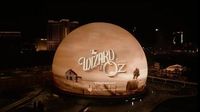In an exciting development for tech enthusiasts and movie lovers alike, Google is set to revolutionize the way classic films are experienced with its innovative use of generative artificial intelligence. The beloved film "The Wizard of Oz" will be reimagined and showcased on the colossal 16K screen at The Sphere in Las Vegas, a venue known for its cutting-edge technology and immersive experiences.
This groundbreaking project marks the first time that The Sphere will display an existing film rather than a specially shot video, offering audiences a unique opportunity to see a classic in a new light. Google’s AI technology aims to enhance the original film by not only scaling the video to fit the enormous screen—boasting over 170 million pixels—but also by adding new details and backgrounds that were not present in the original footage.
Jim Dolan, the Executive Chairman and CEO of Sphere Entertainment, expressed enthusiasm about the collaboration, stating, "The power of generative AI, combined with Google's infrastructure and experience, is helping us achieve something extraordinary." He emphasized the unique partnership with Google, noting, "We needed a partner who could push the boundaries with our teams at Sphere Studios and Magnopus, and Google was the only company capable of handling this task on the world's highest resolution LED screen." This collaboration promises to bring a fresh perspective to the iconic film.
To execute this ambitious project, Google has enlisted the expertise of its DeepMind teams, utilizing advanced models from the Gemini line, specifically Veo 2 and Imagen 3. These algorithms are designed not only to upscale the existing video but also to creatively expand the original scenes, effectively enhancing the visual storytelling of the film. As Stephen Hickson, Google's Director of AI Foundation Research, remarked, the task is "very, very, very large and very, very, very complex," indicating the magnitude of the undertaking.
Despite the excitement surrounding the project, there are concerns regarding the implications of using AI to alter classic films. Generative models have faced criticism in the past, particularly after a viral video reimagined scenes from Andrei Tarkovsky's films, leading some to argue that such alterations distort the original artistic vision. However, the successful screening of "The Wizard of Oz" could pave the way for new opportunities in filmmaking, potentially starting a new era of interaction between technology and classical art.
Meanwhile, in the tech world, another collaboration is stirring interest as Google’s prototype Android XR glasses are set to be released under the Samsung brand. Reports indicate that these smart glasses, which have been showcased since December 2024, are expected to hit the market in 2026. Earlier this week, at the TED2025 conference, Google VP Shahram Izadi demonstrated the capabilities of these glasses, highlighting their potential in augmented reality.
Samsung has been working closely with Google on this project, and the Korea Economic Daily reports that the two tech giants are jointly developing the smart glasses. The collaboration was first hinted at during the XR Unlock event held at Google Campus in New York last December, where images of the smart glasses were unveiled.
Samsung is also preparing to launch its Project Moohan, an Android XR headset, later this year, which adds to the excitement surrounding the advancements in augmented reality technology. While there have been previous suggestions that Samsung might unveil the smart glasses by the end of 2025, the timeline remains somewhat fluid.
As these two projects unfold, they highlight the increasing integration of artificial intelligence and augmented reality into our daily lives. The transformation of "The Wizard of Oz" signifies not just a technological achievement but also a cultural moment, reflecting how classic works can be reinterpreted through modern technology. Similarly, the development of smart glasses demonstrates the ongoing evolution of how we interact with digital content in our environments.
The intersection of art and technology is becoming more pronounced, with companies like Google and Samsung leading the charge. As they continue to push boundaries, audiences can look forward to experiencing their favorite stories and characters in ways previously thought impossible.
In summary, the revival of "The Wizard of Oz" using generative AI and the anticipated release of Android XR glasses under Samsung's brand are just two examples of how technology is reshaping entertainment and our interaction with it. As we move forward, the potential for innovation in storytelling and technology seems limitless, promising a future where the classics meet the cutting-edge.






